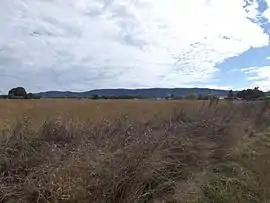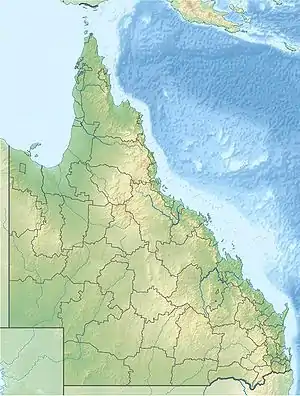Little Liverpool Range
The Little Liverpool Range is a mountain range of the Scenic Rim and Lockyer Creek valley, part of the Great Dividing Range, which is located in the South East region of Queensland, Australia.
| Little Liverpool | |
|---|---|
 | |
| Geography | |
 | |
| Country | Australia |
| State | Queensland |
| Region | South East Queensland |
| Range coordinates | 27°38.3′S 152°28′E |
| Parent range | Great Dividing Range |
Location and features
The range extends from the Main Range to the west of Aratula northwards to the area between Marburg and Hatton Vale where the Warrego Highway crosses the range. The range forms the drainage divide between the Bremer River valley from the Laidley Creek valley, a tributary of Lockyer Creek.
Alan Cunningham and his party were the first Europeans to explore the area. They crossed the range in 1829.[1]
Mountain peaks in the Little Liverpool Range include Mount Castle, Kangaroo Mountain, Grass Tree Knoll, Mt Beau Brummell, Mount Stradbroke, Mount Grandchester, and Two Tree Hill. One of the regions weather stations Marburg radar station is positioned on the range at a height of 370 m (1,210 ft).[2]
Railways
The Little Liverpool Range was an obstacle that hindered development of a railway from Brisbane to Toowoomba. Under the range are two tunnels. One named Victoria Tunnel is 537 m (1,762 ft) long. It is the oldest and longest railway tunnel in the state.[3] The railway has a gradient of between 1 in 50 to nil over the range.[4]
See also
References
- "Laidley". Brisbane City Council. Retrieved 24 June 2009.
- "Queensland Radar Site Information". Bureau Of Meteorology (Australian). Archived from the original on 16 May 2009. Retrieved 24 June 2009.
- "QR History - The Victoria Tunnel". Queensland Rail. Archived from the original on 13 September 2009. Retrieved 24 June 2009.
- "Opening Of The Railway To Gatton". The Brisbane Courier. XX (2, 619). Queensland, Australia. 19 June 1866. p. 2 (Supplement). Retrieved 25 March 2016 – via National Library of Australia.